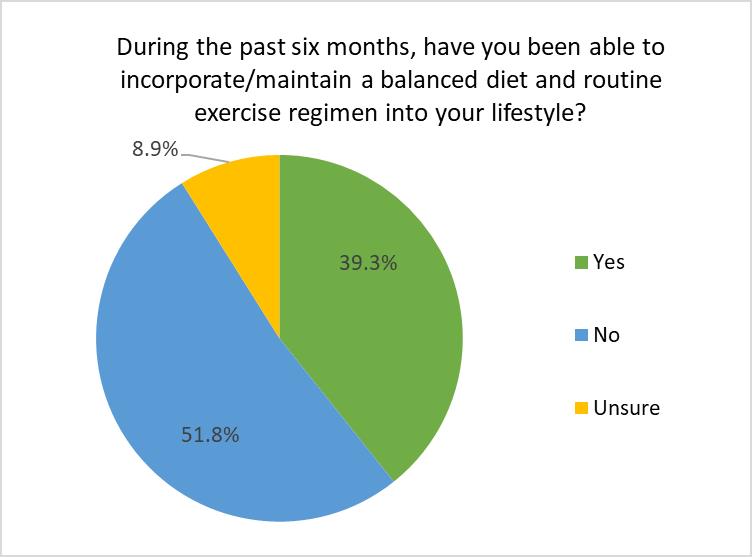March is Multiple Sclerosis Awareness Month, and MSAA has dedicated this year’s campaign to Improving Mental Health and Wellness. As part of the 2021 campaign, MSAA surveyed My MSAA Community members about their experiences with sleep, staying connected, diet and exercise, and self-care. Throughout the month, we will be posting results of the survey along with insights and tips from leading MS neurologists on each topic.
The third topic featured in this series is The Importance of Diet and Exercise. Of those who responded to the survey, more than half stated they were not able to incorporate or maintain a balanced diet and routine exercise program into their life during the past six months. The most frequently identified barriers to achieving these wellness activities included: feelings of being overwhelmed/unmotivated (47%), having limited/no access to a gym or exercise equipment (27%), and unsure of what to do/how to start (20%). Additionally, nearly 55% indicated that having these barriers moderately to severely affected their overall quality of life.
Recognizing these challenges and the critical role proper diet and routine exercise plays in one’s mental and physical health, MSAA asked MS expert Annette Okai, MD to share her insights and helpful strategies on ways to better achieve these key health needs. According to Dr. Okai, “The benefits of a healthy diet on longevity and healthy lifestyle have been studied and proven for years. In addition, it helps with weight control and reducing obesity, which is one of the risk factors for multiple sclerosis.”
“Research suggests that healthy eating may help ease the symptoms of MS. Some benefits include improvement in mood and energy level along with a reduction in other diseases such as diabetes and hypertension, which can negatively impact MS. Eating more servings of fruits and vegetables and foods that are low in saturated fats are the basis for most healthy eating plans. Incorporating one change at a time will help you build slowly and make changes that will last for life. A consult, if possible, with a nutritionist or dietitian can be helpful in educating and setting a path to maintain a healthy eating lifestyle.”
“A healthy diet is complemented by physical activity to provide the best positive effect for healthy living. Physical activity is effective in improving muscle strength, mobility, balance, fatigue, depression, and pain. The benefits gained from consistent activity have long-lasting effects.”
“There are always intentions and resolutions to become more active but taking the first step can be difficult, as underscored by some of the barriers identified in the survey results. Additionally, for some MS patients, decreased mobility also contributes to a lack of an exercise plan.”
“To help overcome these challenges, it is best to start with an easy regimen and build up as tolerated. There are virtual exercise options for MS patients that are suitable for all levels of ability. The virtual option allows people at home to participate in various activities, some for free, allowing for flexible timing, with less worry regarding mobility and membership fees. As with any changes, it is best to consult with your healthcare provider to discuss options that will work best for you.”
MSAA would like to thank Dr. Okai for providing her expert advice and helpful tips on this important topic along with her earlier post on The Importance of Sleep. Please look for our final article on The Importance of Self-Care during the last week of March.
